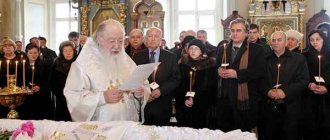Funerals are a sad event, often associated with a large number of dark superstitions and folk traditions. For Christians, death is not the end, but the transfer of the soul to another world, where it will remain until the general resurrection.
The Gospel of John contains the words of the Lord: “I am the resurrection and the life; He who believes in Me, even if he dies, will live.” In this regard, the relatives of the deceased may have questions: “How long after death is a person buried?”, “Is it possible to ease the transition to eternal life?”, “How to properly prepare the body for burial?” This article will try to answer these questions.
When is it customary to hold a funeral in Orthodoxy?
Orthodoxy attaches great importance to the number 3. This is how many days it took Jesus to resurrect after crucifixion. It is generally accepted that for three days after death the soul wanders the earth, and then, together with its guardian angel, goes to the Heavenly Kingdom. In addition, the figure is closely related to the Trinity, which includes the Father, Son, and Holy Spirit.
The desire to bury the deceased on the third day also has practical significance. In ancient times, when medicine was not yet so developed, there were cases of burial of living people, as a result of which the term “taphophobia” appeared in the Russian language. It is understood as a panicky fear of being buried alive if it was mistakenly believed that a person had died.
Such situations are usually associated with lethargic sleep, which previously could not be distinguished from death. Today, doctors accurately confirm death, but the tradition has not lost its meaning. And even if the pathologist does make a mistake, three days before the burial allow him to observe the deceased and notice the appearance of cadaveric spots.
Can burial be performed before or after the 3rd day?
According to Christian priests, a person cannot be buried before the third day. Until this time, the soul is still closely connected with the body, and if the burial is carried out earlier than usual, this connection will be severed. A violent break will lead to the fact that the soul will have nowhere to go, and this will bring it unspeakable pain and doom it to eternal suffering. However, in some cases a person may be buried earlier. This happens during wars, epidemics, or when staying in regions where there is stifling heat in the summer.
If we talk about the fourth, fifth and subsequent days after repose, then Orthodoxy allows such burial. The reasons for the delay may be:
- violent death requiring a forensic medical examination;
- Some relatives live far from the place of death of the person (they need time to come to the funeral).
In such a situation, an embalming procedure is carried out, which prevents decomposition and allows you to preserve the body in its natural form.
Burial rite: meaning for the Orthodox, ritual preparation and funeral
To pay tribute to the deceased and help him get to heaven, relatives and clergy perform a number of rituals. Some of them (those based on Orthodox canons) are performed in church, others - at home.
Features of the rituals:
- unction before death (blessing of oil): the sacrament is performed for Orthodox and Catholics, the essence of the rite is reduced to anointing the body with oil, which is precisely what contributed to the appearance of the corresponding name, the roots of the rite go back to the time of Jesus Christ, it is performed on sick people who have not lost consciousness, who over 7 years old, and also provided that they are not violent;
- Confession of the departing person is a verbal form of admitting one’s guilt in committing sins, relevant for Abrahamic religions (Judaism, Christianity, Islam), and confession presupposes the need for repentance followed by the avoidance of sins; in the New Testament it is written that confession is mandatory before saying a prayer or performing rituals (Eucharist - communion, as well as Baptism);
- communion of the dying: it is desirable for a believer to have time to unite with God in Christ before death (this is the purpose of consuming bread and wine consecrated in a special way), through this action a person comes to eternal life, receives salvation, and it is believed that all other sacraments are preparation for communion (Eucharist ), because this is the pinnacle of the believer’s unity with the Lord, which means the highest degree of importance;
- parting prayers: read after the death of a person, the parting canon contains words about the separation of paths for the righteous and the sinner, if the first is carried by angels to the bosom of Abraham, then the second goes through ordeals while he is in hell, awaiting a Private Judgment, when parting prayers are read, the soul of the deceased gets a chance for the forgiveness of some of her sins, which makes her fate easier even if she ends up in hell, and the sacred text can also be read by relatives, not necessarily by a priest;
- ablution: performed on a flat surface (a wooden bench covered with oilcloth is often used if the body is not sent to the morgue), the Angelic Hymn and the Trisagion are read, bowing before the images, ablution begins from the head, moving to the lower part of the body, and the purpose of this rite is purification before the soul goes to the Lord;
- dressing in everything clean: if necessary, the body is embalmed, at the last stage it is dressed, preference is given to new items of clothing, if it is not possible to quickly buy, they take the clean things of the deceased (you cannot use someone else’s clothes for this purpose), they must be ironed;
- Litiya - a special type of prayer, can be read for various occasions, among them - helping the deceased, this sacred text is shorter than a memorial service, differs in the time of reading - it is performed at the all-night vigil (the place of action is the vestibule of the temple);
- funeral service: distinguished by the possibility of pronouncing sacred texts once, but not more often, consists of a large number of prayer words that are said over the deceased in the temple at the altar, you can ask the clergyman to conduct the service at home or at the morgue (those who come occupy the funeral hall).
The difficulty of preparing the deceased for the funeral (the soul for presentation before the Throne of the Lord) is an important stage, since after it there will be no opportunity to influence invisible processes. All that remains is the rite of remembrance of the deceased.
It must be remembered that the deceased does not have the opportunity to repent, which means that relatives must ask for forgiveness for his sins.
Funeral ceremony
On what days is it unacceptable to bury?
When calculating when the funeral will take place, it is necessary to take into account the days on which it is undesirable to conduct a burial. In Orthodoxy there are no clear prohibitions regarding the day of the week, but some consider Monday unlucky. This is superstition. It’s just that people once decided that Monday is an unlucky day; you can’t plan serious things or start anything on this day of the week. But all this rather depends on our adaptation to the work process after the weekend, and nothing else. And, of course, the universal love of Mondays has nothing to do with funerals and wakes. Regarding whether it is possible to commemorate on Monday, the church says that the day of the week does not matter. The only exception when the church prohibits funeral services is Monday of Holy Week. This day follows the passing of Easter. And if the memorial date falls on her, the commemoration should be postponed to the next day - Tuesday, called Radunitsa. There is a tradition on this day to remember all the dead and visit the graves in the cemetery.
Friday is a memorial day. But, according to traditions, believers can be buried on this day if there is no Christian holiday on Friday. Funerals are allowed on Sunday, but the church believes that it is not worth disturbing the Lord's peace on this day.
On the remaining days of the week, nothing prevents Orthodox Christians from burying loved ones. Tuesday is considered the most favorable, but at other times you can organize a ritual ceremony and help a person find eternal peace.
Who is not buried according to church canons
Representatives of certain categories not related to the Orthodox Church are noted. Their funerals are carried out according to a different scheme, which eliminates the possibility of burial, in accordance with the canons of Orthodoxy: it is forbidden to administer unction to the dying person, to perform a funeral service for the deceased, or to put a cross on his grave. Categories of people who go to the cemetery without passing the temple:
- non-believers: those who belong to a different faith can receive help from other people; representatives of churches of different faiths, as a rule, do not undertake to perform funeral services and conduct other important religious rites for representatives of a different faith;
- atheists: the church does not perform any actions on the bodies of non-believers, then a civil memorial service is held;
- suicides, criminals: people who killed themselves renounced their faith during their lifetime, they should be buried separately from believers without a cross on the grave and reading prayer words, a civil memorial service is suitable for this case; for comparison, criminals today can rest next to believers if they were able to repent during their lifetime , change, get off the wrong path and return to God;
- unbaptized: those who did not have time to participate in the sacrament of Baptism are deprived of the right to a funeral service, despite the love for God in their souls, but such souls do not go to hell, but are in a special place.
Atheists are not given a funeral service, are not buried in a church cemetery, and prayers are not read over the dead of this category. During their lifetime, they abandoned faith, and often also spoke about it with contempt and laughter. Such behavior is a grave sin. In addition, the church does not take revenge for disrespectful attitude, and the refusal to conduct the Rite of Burial and the funeral itself, accompanied by prayers, is a consequence of a person’s choice: it is impossible to forcefully come to God through the cross, it is necessary to make a conscious choice.
Suicides, unbaptized people, people of other faiths and atheists are buried without a church funeral service
Is it possible to hold a funeral on church holidays?
The correct choice of burial date largely influences the soul’s ability to reach heaven without obstacles. Therefore, Christianity does not allow burying the deceased on major church holidays. It is better to postpone the funeral if on the third day after death it occurs:
- Easter;
- Christmas;
- Protection of the Virgin Mary;
- Trinity;
- Good Friday.
If the commemoration coincides with Easter, they are transferred to Radonitsa. If there are any doubts regarding the calculation of the day of burial or the appointment of a date for church holidays, relatives should first consult with the clergy.
Catholicism, Protestantism
Western movements do not adhere to such strict rules regarding burial. Moreover, funerals often occur a week or even several months after death. Various circumstances can contribute to this: relatives cannot gather earlier, the ground is frozen and cannot be dug, household members are robbing money for the funeral ceremony. If the waiting period is short, up to 10 days, then to preserve the appearance the body is subjected to an embalming procedure. If the wait is longer, the remains of the deceased are stored in a corpse storage facility, and the funeral itself is carried out with a closed coffin.
Funeral arrangements from the Honest Agent service
If you want the burial to take place in strict accordance with religious canons, please contact. We have been organizing funerals for many years, so we are perfectly familiar with all Orthodox traditions. Our employees know well how funerals are conducted, on what day a person must be buried and what rules must be followed when conducting a funeral ceremony.
When preparing for burial, our bureau provides comprehensive customer service. If you turn to the help of “Honest Agent”, you can count on the following services:
- preparation of the necessary documentation;
- preparation of the coffin and ritual accessories, taking into account the relatives’ budget;
- transportation of the deceased to the morgue and cemetery;
- digging a grave;
- farewell hall rental;
- installation of monuments and gravestones.
We understand well all the pain of your soul, therefore we work efficiently, carefully and with special attention to every detail. Contact us to bury your relative with dignity, taking into account Christian traditions. To receive advice or order funeral services, call us or request a call back!
Tell your friends:











